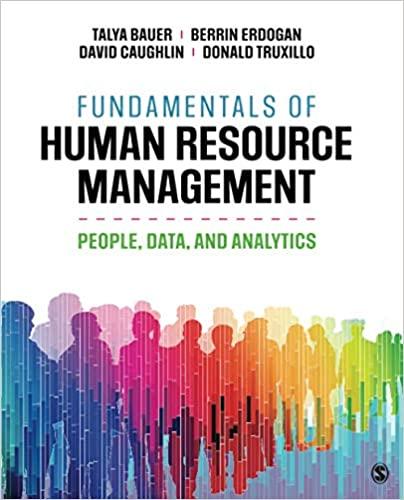Avoiding pay discrimination is an important consideration when designing and implementing a compensation system, and it is
Question:
Avoiding pay discrimination is an important consideration when designing and implementing a compensation system, and it is a focal point of several U.S. employment and labor laws. Perhaps most well known is the Equal Pay Act, signed into law by President John F. Kennedy in 1963. Since then, additional legislation like the Civil Rights Act of 1964 and the Lilly Ledbetter Fair Pay Act of 2009 have been introduced to ensure equal pay for equal work.
In recent years, pay disparities between men’s and women’s professional sports have received increased scrutiny. The U.S. women’s soccer team has featured prominently on the international stage by winning major competitions, including Olympic gold medals in 1996, 2004, 2008, and 2012 and World Cup titles in 1991, 1999, 2015, and 2019. Some 30 million television viewers watched the U.S. women’s team defeat Japan in the 2015 World Cup, and their 2019 defeat of the Netherlands smashed global ratings records. Yet despite all of their success, the U.S. women have not received equal pay from the U.S. Soccer Federation as compared to the pay the men have received.
Some people contend that historically, women’s soccer has generated less revenue than men’s soccer and so argue that the ongoing pay discrepancy is justified. In contrast, those in favor of equal pay point to more recent data that show the U.S. women’s team earned more revenue than the U.S. men’s team in 2016. Some argue that the men and women do not perform equal work, pointing to the fact that, to qualify for the World Cup, the women’s team must play 5 games over 2 weeks, whereas the men’s team must play 16 games over a 2-year period. Because of this difference, some believe that the men’s qualification schedule is more arduous than the women’s, thereby warranting higher pay, but others argue that the women’s schedule is more condensed and thus more intense....
Case Discussion Questions 1. Why do you think pay fairness is important for employee job performance and retention?
2. If you were a leader at the U.S. Soccer Federation, how would you have responded to the U.S. women’s team assertion that pay inequality existed?
3. How do you define equal work when it comes to the men’s and women’s soccer players?
4. Given what is described in this case, why do you think these pay discrepancies exist? Do you think that they are fair or unfair? Why?
5. In your opinion, when it comes to equal pay, what is the next step for the U.S. women’s soccer team?
Step by Step Answer:

Fundamentals Of Human Resource Management People Data And Analytics
ISBN: 9781544377728
1st Edition
Authors: Talya Bauer, Berrin Erdogan, David E. Caughlin, Donald M. Truxillo





